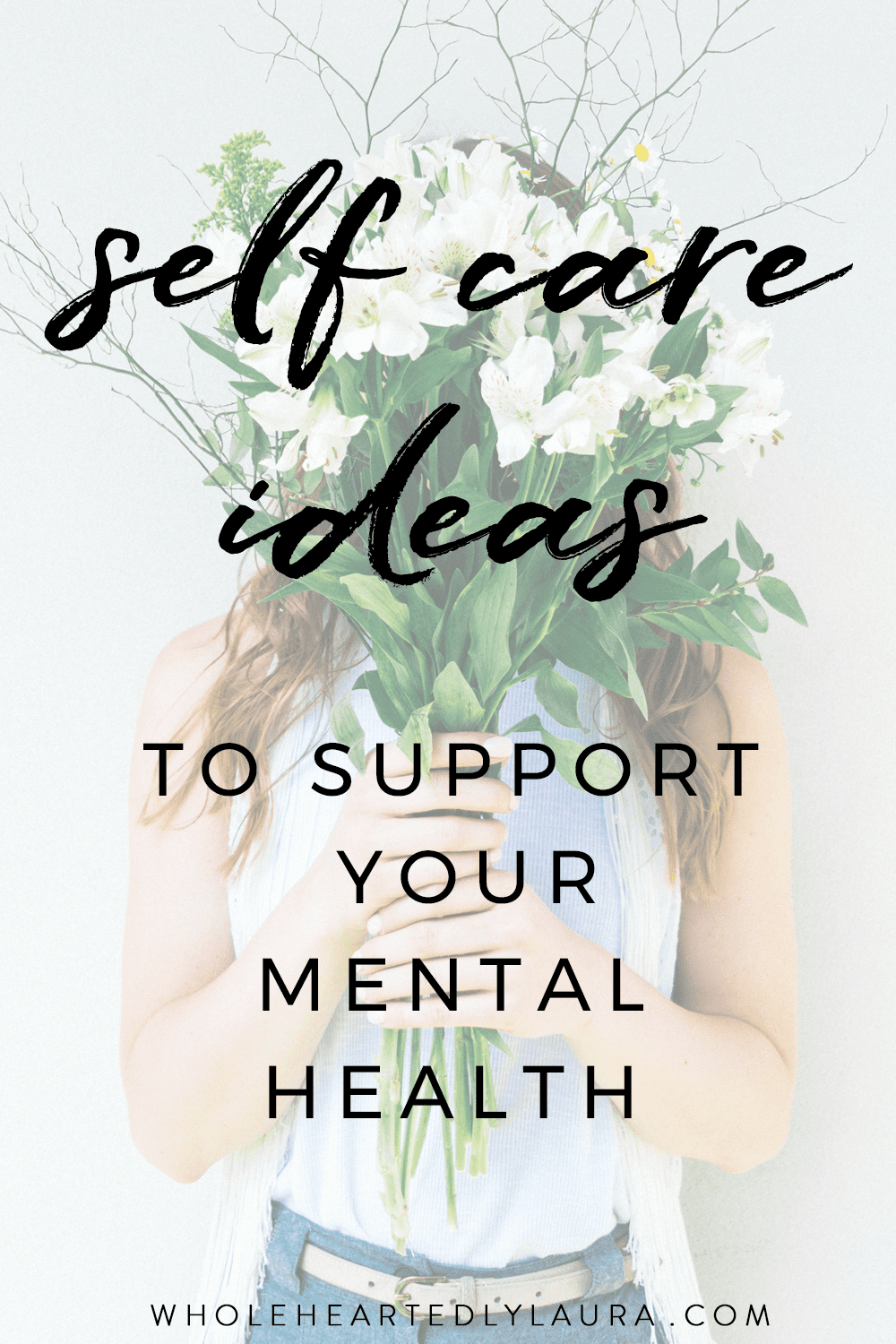Self care is all about taking care of ourselves and getting our needs met so that we’re able to thrive both physically and mentally.
But so many of us struggle to really put ourselves first and do the things we need to keep ourselves well – as cheesy as it sounds, we really can’t pour from an empty cup. By making sure that we’re taking care of ourselves we’re better able to show up and care for others. This is most definitely true of self care and your mental health.
Whether you feel your mental health issues are severe or more mild, you still deserve and need self care.
What I’ve found in myself is by increasing my self care at the right time (i.e. when I first start to notice that something might not be right) I’m able to avoid things getting worse. I feel much more emotionally resilient when I have some kind of base level of self care in my life too.
So what kind of things should you do to take care of your mental health? Well, I’m going to give you a list of ideas to inspire you! These are just a few of the things that have helped me when I’ve noticed my mood dipping or my anxiety increasing.
Be mindful of your social media use
Social media can sometimes be a place that connects you with others and offers you inspiration – but at the same time it can also be a shit show! At the moment I’m finding the news cycle really upsetting and while I don’t want to not be aware of what’s going on in the world, I needed to find a balance – coming of Twitter for a while has really helped.
If social media makes you feel bad, take a break!
See your Doctor
If you feel like your mental health isn’t great then arranging a chat with your doctor is one of the best forms of self care. Seeing them doesn’t mean you’re going to get put on pills immediately – though remember, there’s absolutely no shame in taking them – they can make all the positive difference to your mental wellbeing. They can refer you for talking therapies, in some areas of the UK you’re even able to self refer too. Plus they should check over your general physical health, all of our health systems are connected and if you’re having an issue physically such as a thyroid problem, that can have knock on impact on your mental wellbeing too.
Take a day off
Sometimes a day off to stay in your Pj’s and get some rest is just what you need! If you’re feeling stressed with work or just exhausted, giving yourself a day off can be just what you need to feel replenished.
Watch something funny
I have a few TV shows and movies that I can watch again and again. As I can sometimes get a bit anxious and overstimulated, watching ‘comfort’ TV especially if it’s funny, is a brilliant form of self care for me.
Get outside
If you can, getting outside to get some fresh air and to get some gentle movement can really help you feel better in yourself. Connecting with nature has a proven positive impact on your mental wellbeing so building that into your week whenever you can is a great self care strategy.
Arrange to see friends
Seeing friends who you enjoy spending time with and who make you feel good can be a really helpful way to support your mental wellbeing. Maybe talking to them about how you’re feeling and what you’re experiencing will help, but sometimes even just having someone else there to have a conversation with can help stop your mind from ruminating on how you’re feeling.
Eat something that makes you feel good
What I eat can have a massive impact on my mental health. I really notice how super sugary or stodgy carbs make me feel tired and how too much caffeine can impact how anxious I feel. When I want to feel better, eating seasonal meals with lots of fruit and vegetables such as a salad or smoothie in summer and soup or stew in winter really helps. There’s something especially comforting about soup in the colder months!
RELATED POST: My Self Care Routines and Rituals
Talk or write about how you feel
I know we’ve already covered seeing friends and going to the doctor, but just to say it again – talking about how you’re feeling can really help. Talking to others so they know you’re struggling also enables them to help take care of you so it’s a double whammy of good stuff! Asking for help with things you might currently be finding difficult is also a great move.
If you find talking hard, try writing instead. Journaling to help you process difficult or uncomfortable emotions can be an amazing tool too. You don’t need a fancy notebook to do it in, sometimes a cheap lined pad works best as you’re able to write whatever needs to come out and you can just bin it afterwards if that feels better to you.
Get the right amount of sleep
When it comes to your mental wellbeing sleep is great, but getting the right amount of sleep is better. Too little can have a negative impact but getting too much can also be unhelpful. 7-8 hours is usually the magic number but see what works for you and what makes you feel your best. If you’re dealing with depression you may be likely to sleep for too long leaving you feeling groggy. Try different sleep times, both in terms of how much total sleep you get and what time you go to bed to see what works best for you from a mental health perspective.
Have a helpful routine
I’m a big lover of having a good morning and evening routine – if you’re mental health is suffering, looking at what you do in the morning and before bed can help. Perhaps you need an earlier bedtime and maybe getting outside in the morning for a brief walk could really help. Building in some solid self care at these times gives you a lot of bang for your buck – the morning really sets you up for the day and the evening routine for a good sleep. Think time off your phone, eating a good breakfast, getting outside, meditating etc.
Don’t try and do too much
Depending on how you’re feeling, trying to do too much will backfire leaving you feeling worse and totally overwhelmed. Self care is only self care when it works. If you’re struggling with your mental health doing one small thing might be all you can manage, and you know what, that’s great! Little things all count and all add up. So be gentle with yourself, do what you can and let it build up from there.
A few months ago when my anxiety was getting fairly bad, I found that reaching out and asking for help, drastically reducing my caffeine intake and little day to day things like relaxing watching my comfort TV and meditating really helped it reduce to the point where I don’t really experience it any more, at least not in the way I was then.
Enjoy this post? Check out my free Ultimate Self Care Kit to help you get more self care in your life
Remember that you deserve to take care of yourself – whatever that self care might look like for you. Your mental health is just as important as your physical health.
I’d love to know if you find any of these ideas helpful or if you try them out. What forms of self care do you find helpful for supporting your mental health?
↓ Pin it for later ↓





0 Comments